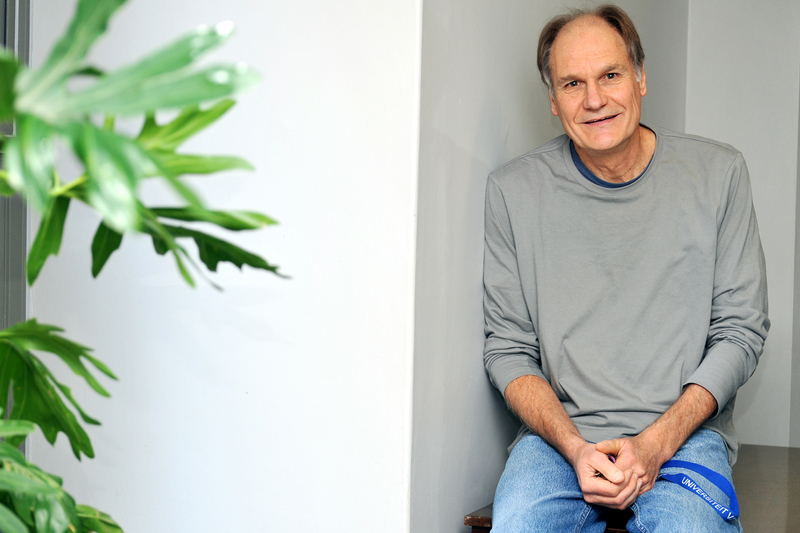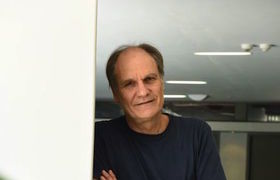An ode to Emer Prof George Ekama
03 May 2023 | Story Nicole Forrest. Photo UCT News. Read time 8 min.
Emeritus Professor George Ekama of the University of Cape Town’s (UCT) Faculty of Engineering & the Built Environment (EBE) passed away on 19 February 2023. The news has been received with great sadness by friends, colleagues and the academic community.
With hundreds of publications and the seminal work on biological wastewater treatment to his name, the 73-year-old academic was a world-renowned figure in the field. However, when speaking with those who were fortunate enough to know and work with Emeritus Professor Ekama, it quickly becomes clear that the legacy he leaves behind is not just professional, but deeply personal too.
Engineering in his blood
Ekama began to develop an interest in mechanics and engineering from an early age. With his father, grandfather and uncle all being qualified engineers, one might say that the profession was in his blood.
In various interviews throughout his life, Ekama recalled watching his father take things apart and put them back together in the garage of their home. The most notable being the family car. This, he said, sparked his interest in engineering and was ultimately what encouraged him to follow in the footsteps of his ascendants.
After matriculating – with grades that were not entirely reflective of his abilities – the budding scientist decided to pursue a bachelor’s degree in engineering. Ekama chose civil engineering because it was the easiest route to obtaining a bursary, while the culture and lifestyle offered by the Mother City attracted him to UCT.
“When he was doing his PhD, George actually moved into the laboratory. He took his bed and a stove there and, apparently, had a great big pot.”
Following his BSc, Ekama got a job on the container quay in the Cape Town Harbour. However, this was short-lived as the monotony of the work drove him to further his studies and enrol in evening postgraduate classes at the university.
It was at this juncture that the young engineer met UCT Department of Civil Engineering Chair of Water Resources and Public Health Engineering Professor Gerrit van Rooyen Marais, and his long, illustrious career began in earnest.
A man of his work
At the time, Professor Van Rooyen Marais was focused on municipal water and wastewater treatment. The area of study captured Ekama’s interest and motivated him to pursue his master’s and PhD. During this time, Ekama and Van Rooyen Marais developed models for removing nitrogen and phosphorus from wastewater that would become the international standard.
Having completed his PhD, Ekama joined the engineering faculty at UCT in 1978 as a soft-funded staff member. It was during this period when Professor Neil Armitage, who specialises in urban water management, first got to know Ekama.
Professor Armitage recalled that while the congenial lecturer’s long hair and laid-back attire may have created the impression that he didn’t take things too seriously, his passion for his subject meant that he was anything but.
“I was a postgraduate in his class, way back in 1986 and 1987,” said Armitage. “We used to have weekly lectures in the evenings and we’d get so much homework that it would basically take us the entire weekend to do it – just in time for the next lecture!”
“Going on 24 hours a day, seven days a week. That was just the kind of dedication George had.”
It wasn’t that Ekama expected this level of dedication only from his students. He consistently showed an equal, if not greater, commitment to his work.
“According to some of those who had been with George in the early days, when he was doing his PhD, George actually moved into the laboratory. He took his bed and a stove there and, apparently, had a great big pot.
“Every now and then, he would cycle down to the shop to get some veggies for a stew and pop them into the pot so that they could stew away while his experiments were on the go,” noted Armitage.
“He didn’t need to do this, but the nature of the work that he dealt with – biological systems – meant that the experiments were continuous; going on 24 hours a day, seven days a week. That was just the kind of dedication George had.”
Passion paired with compassion
Ekama’s fervour for his research continued throughout his career, leading to extraordinary achievements and motivating many young scientists to pursue their studies in wastewater management.
Associate Professor David Ikumi, a student and mentee of the late professor, is one such individual. “I first met Professor Ekama in 2006 when he was my lecturer for the wastewater treatment course,” he said.
“From attending the lectures, I was inspired to consider wastewater treatment as a potential career specialisation. That led to me pursuing a master’s under his supervision and later upgrading that project to a PhD.
“After completing my PhD, he continued to act as my mentor and helped me move towards my career goals. As academics, we often face many distractions and can easily be swayed out of focus. Professor Ekama taught me to have a specific vision and to pursue my main goals with patience.”
As a man of faith, he never hesitated to serve others; a quality that helped to make Ekama an exceptional mentor. Associate Professor Dyllon Randall highlights that it was his combined patience, depth of knowledge and humility that made Ekama a great mentor.
“I remember visiting his office once and asking him a question about some course material I didn’t understand. He turned to a pile of papers, scrambled through them and announced that the explanation is ‘described on page two, paragraph three’,” said Associate Professor Randall.
“The paper was written by him, but he never mentioned that. He was very humble. He also had an incredible mind and was so generous with his time. His passion for people and research was clear.”
In addition to his infectious passion for wastewater management, Ekama’s friends, colleagues and students remember him for his caring and compassionate nature. Lecturer Teboho Mofokeng recalled with fondness the late professor’s humanity and open-minded approach to making mistakes.
“As a master’s student, I accidentally scratched the rental car during one of my site visits. I was terrified of what the outcome would be when I reported the incident to George. But he simply smiled broadly and said, ‘To make an omelette, you have to break some eggs.’ That response has stayed with me ever since,” she explained.
Emeritus Professor Mark Alexander, who joined the Department of Civil Engineering in 1992 when Ekama became the head of research in the department, noted that Ekama immediately befriended him and became his mentor at the time, helping to propel his career at UCT.
“George helped me to find my way through the myriad [of] UCT processes and was a great support in my settling into the department. He was instrumental in my becoming a UCT Fellow in 2005, being my promoter and encourager in the process,” he said.
A lifetime of achievements
Ekama’s deep interest in – and unmatched understanding of – water conditioning and chemistry saw him contribute to plenty of groundbreaking international research.
During his time as head of the Department of Civil Engineering at UCT from 2003 to 2007, the late professor was awarded an A1 rating by the National Research Foundation, which he maintained until his passing.
Ekama was also the recipient of the International Water Association Project Innovation Award (2012) and the Order of Mapungubwe in Silver (2013). He was named a Legend in Science by the Academy of Science of South Africa (2017) and received the Water Research Commission Legend Award (2021).
 This work is licensed under a Creative Commons Attribution-NoDerivatives 4.0 International License.
This work is licensed under a Creative Commons Attribution-NoDerivatives 4.0 International License.
Please view the republishing articles page for more information.










